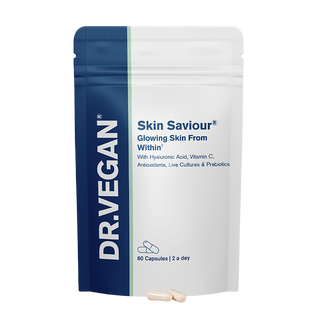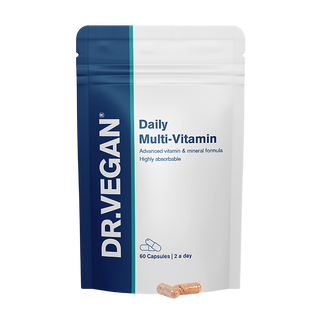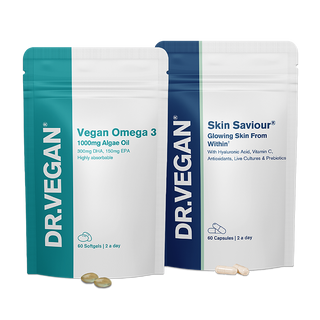What does Zinc do to your skin?

While it may not receive as much attention as nutrients like collagen, zinc is an essential 'beauty mineral' and one of your skin's best friends. It plays a crucial role in maintaining healthy, youthful-looking skin. A deficiency in zinc can lead to acne, skin conditions, sagging skin, wrinkles and a loss of elasticity.
What is zinc?
Zinc is the second most abundant trace element in the body and is essential for good health. One of the most recognised functions of zinc is its role in supporting the immune system. But did you know that it also plays an important role in growth, cognitive function, vision, fertility and reproduction?
It is important to note that zinc cannot be stored for long periods in the body and therefore daily consumption is required to maintain overall health.
Not sure what your body needs? Create your Diet Profile.
Benefits of zinc for the skin
Research suggests zinc has the following skin benefits:
Anti-inflammatory
Along with other nutrients, zinc can help to lower skin irritation.
Anti-bacterial
Evidence shows zinc may help resist bacterial skin infections.
Antioxidant
Zinc is an antioxidant and can help protect our cells from the harmful effects of ‘free radicals’ that contribute to oxidative stress. Oxidative stress is the main contributor to ageing and many chronic health conditions. Free radicals can be caused by a wide range of factors, including environmental pollution, the sun’s UV rays and stress.
Anti-viral
Low levels of zinc are associated with an increased susceptibility to infections. Zinc has been shown to help support the signs of common colds and shorten their duration.
What skin problems can zinc help with?
Zinc is involved in over 300 enzymatic processes and plays an important role in regulating Vitamin A, which supports healthy skin. Deficiencies in zinc have been shown to give rise to a range of skin concerns. Zinc has since been studied for its use in the following:
Acne
Zinc may help with acne by reducing sebum secretion. It is often used as an adjunct in treatments and has been shown to be effective at reducing the skin damage caused by acne. Discover how to get rid of acne.
Rosacea and eczema
Irritation can occur with chronic skin conditions, including eczema or rosacea.
Zinc possesses natural anti-inflammatory properties that help reduce swelling, redness and irritation.
Topical applications of zinc are soothing and have been useful to help control flare-ups of eczema.
- Wounded skin: Zinc’s antibacterial properties have been used for a number of dermatological conditions, including skin infections. Zinc also aids in healing.
- Dry skin: Zinc supports the maintenance of the skin and mucous membrane integrity. When the skin’s barrier is strengthened, it may help reduce transepidermal water loss that occurs with dry skin.
- Dull skin: Zinc may help fight toxins that tend to cause blemishes and contribute to dull skin.
You may also be interested in the common signs of rosacea and the natural ways to treat eczema.
Skin Saviour®

Zinc deficiency symptoms
A deficiency or inadequate consumption of zinc can cause a multitude of symptoms. These can range from hair loss, lowered immunity and nausea to white marks on nails and slow wound healing.
Even a mild deficiency of zinc can have a significant impact on health and it is important to note that certain factors can predispose an individual to deficiency. Examples include rheumatoid arthritis, stomach acid issues, diabetes, alcoholism or malabsorption conditions (i.e. Crohn's disease). Some medications can also interfere with zinc’s absorption; these include oral contraceptives, HRT and diuretics (water pills), amongst many others.
It is important to remember that a deficiency in Zinc can occur a long time before symptoms begin. Learn the 10 signs of zinc deficiency. The quickest way to check if you may have a nutrient deficiency is by creating your free Diet Profile. It only takes 3 minutes and can help show you what your diet may be missing to support your skin health.
Foods high in zinc
Zinc is abundant in oysters and meat but can also be found in a wide range of plant-based foods, including legumes, pumpkin seeds and wholegrains.
Although incredibly nourishing, certain foods like legumes or wholegrains also contain high amounts of ‘phytates’ which can impair the absorption of zinc.
Tip: To reduce the phytate content in your legumes, soak them overnight in water before cooking them.
A daily multi-vitamin, like DR.VEGAN'S award-winning Daily Multi-Vitamin, can also help you achieve the recommended nutrient intake, particularly when following a plant-based diet.
Daily Multi-Vitamin

Zinc dosages
At different stages of life, you may require different doses of zinc.
As a general guide, these are the daily recommendations:
- Adult: 7-9.5mg
- Pregnant: 11mg
- Lactating: 12-13mg
As we age, the absorption of zinc is also lower. This is also why we need to always consider high-quality supplements, free of unnecessary ingredients, to support optimal absorption and efficacy.
The maximum recommended zinc intake is 40 mg daily. This amount should not be taken long-term or exceeded unless advised by a professional to do so.
It is best to take a zinc supplement, away from Iron or Calcium supplements, as these compete for absorption.
Zinc supplements
Maintaining healthy, radiant skin goes beyond topical treatments and a good skincare routine. Ensure you are staying hydrated and eating a balanced diet, including foods rich in the specific nutrients needed for your skin condition and include supplements to fill any nutritional gaps.
The best types of zinc supplements include:
- A bioavailable form of zinc that is kind to your digestion, easily absorbed and utilised by the body.
- A supplement that combines complementary nutrients for a holistic approach to your health goals.
If you're looking to nourish your skin from within, you may wish to add Skin Saviour® to your daily routine to help maintain healthy, radiant skin. Developed by experts, Skin Saviour® is a high-strength, highly absorbable formula to counter blemishes and fuel your body's natural collagen production for a clearer and glowing skin complexion. Along with Zinc, Vitamin A and C, it also has a blend of probiotics, prebiotics and botanicals packed with antioxidants. 80%* of customers who take Skin Saviour® find it more effective than other skin care remedies.
You could also consider DR.VEGAN's Skin Health Bundle, which provides both Vegan Omega 3 and Skin Saviour® for skin health. Vegan Omega 3 supports skin health by reducing tenderness and protecting skin against age-related damage, helping with conditions including acne, psoriasis and eczema.
Side effects of zinc
Zinc supplementation is generally considered a safe and effective way of increasing your levels of zinc, along with increasing your dietary sources. But too much of it can impact our body’s ability to absorb the mineral copper, leading to anaemia and weaker bones. Some other side effects linked to taking too high doses of zinc supplements include nausea, stomach pain or diarrhoea.
Make sure to not exceed the maximum recommended dose and do get in touch with your GP if you experience any negative side effects.
You may also enjoy reading:
- Understanding and managing Psoriasis
- How gut health affects the skin
- The truth about botox
- What men should know about skin health
- How to get clear skin for men: A men's skincare guide
- Best foods for thyroid health
- Caring for your skin during menopause
Discover our range of vegan vitamins and supplements.
References
- Roohani N. et al.(2013) Zinc and its importance for human health: An integrative review. J Res Med Sci;18(2):144-57. Zinc and its importance for human health: An integrative review - PMC (nih.gov)
- Decker, A. and Graber, E. (2012). Over the counter Acne Treatments. J Clin Aesthet Dermatol; 5 (5) :32-40. Over-the-counter Acne Treatments - PMC (nih.gov)
- Lin, Pei-Hui. Et al (2018) Zinc in wound healing modulation. Nutrients; 10 (1), 16. Nutrients | Free Full-Text | Zinc in Wound Healing Modulation (mdpi.com)
- Gans, EH. et al (1978).Oral zinc therapy of acne. Absorption and clinical effect. Arch Dermatol; 114 (7):1018-20. Oral zinc therapy of acne. Absorption and clinical effect - PubMed (nih.gov)
- Gupta, M. et al. (2014) Zinc therapy in dermatology : A review. Dermatolo Res Pract; 2014:709152. Zinc therapy in dermatology: a review - PubMed (nih.gov)
- Faghihi, G. et al (2008).The efficacy of '0.05% Clobetasol + 2.5% zinc sulphate' cream vs. '0.05% Clobetasol alone' cream in the treatment of the chronic hand eczema: a double-blind study. J Eur Acad Dermatol Venereol;22(5):531-6. The efficacy of '0.05% Clobetasol + 2.5% zinc sulphate' cream vs. '0.05% Clobetasol alone' cream in the treatment of the chronic hand eczema: a double-blind study - PubMed (nih.gov)
- Bamford, JT.(2012) et al. Randomized, double-blind trial of 220 mg zinc sulfate twice daily in the treatment of rosacea. International Journal of Dermatology ;51:459–462. Randomized, double-blind trial of 220 mg zinc sulfate twice daily in the treatment of rosacea - PubMed (nih.gov)
- Zou, P et al . (2022)Trace element of zinc and skin disorders. Front Med (Lausanne);9 :1093868. Trace element zinc and skin disorders - PMC (nih.gov)
- National Institutes of Health :Office of Dietary Supplements. Zinc - Health Professional Fact Sheet (nih.gov)
*Based on a UK survey conducted by DR.VEGAN® of 96 customers, nationally representative, during May 2023. All customer survey findings reflect our own efforts and have not been influenced or verified by any external organisations or third-party entities.
Want to hear more from our nutritionists? Sign up to our email newsletter for insights and exclusive offers:



















